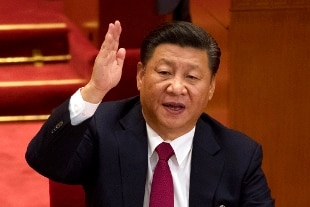- Hong Kong, Carrie Lam: if the situation worsens, China's intervention is not excluded
- China: "No 'Game of Thrones' with the United States, but respect our sovereignty"
- Hong Kong continues the challenge to prohibit wearing masks. Metro and trains stopped after vandalism
- Thousands on the streets in Hong Kong challenge the ban on wearing masks: barricades and fires
Share
October 14, 2019The supporters of "separatism" in China will be "torn to pieces". It is the harsh warning launched by President Xi Jinping, while active militancy for independence and Tibetan protests in Hong Kong are continuing. The head of the Chinese state released these statements during a visit to neighboring Nepal, according to a note from the Chinese Foreign Ministry. "Anyone engaged in separatism in any part of China will be reduced to dust and torn to pieces," Xi said. "Every external force that supports the division of China (...) deludes itself," he added during a meeting with Nepal's Prime Minister Sharma Oli. The latter assured Xi Jinping that his country, on the border with Tibet (southwest China), will allow "no force to use Nepalese territory to carry out anti-Chinese separatist activities", claimed the note of Chinese diplomacy .About 20 thousand Tibetans live in Nepal. But under pressure from Beijing, the current Nepalese communist government takes a firm stand against their militant activities in the country. If Xi Jinping did not mention any region in his observations on separatism, his comments come at a time when protesters, sometimes violent, also had clashes with the Hong Kong police yesterday. This region, located south of the vast Chinese territory, is a former British colony returned under the authority of China in 1997. It enjoys wide autonomy, freedom of expression and an independent judiciary.
But Hong Kong was effectively blocked in June by protesters demanding greater autonomy in the face of growing control in Beijing. China has accused foreign countries, including the United States, of blowing on the fire of protest by encouraging protesters and shaking the specter of military intervention to restore order. This option, however, seems unlikely at the moment, because it would undermine Hong Kong's status as an international financial center.

